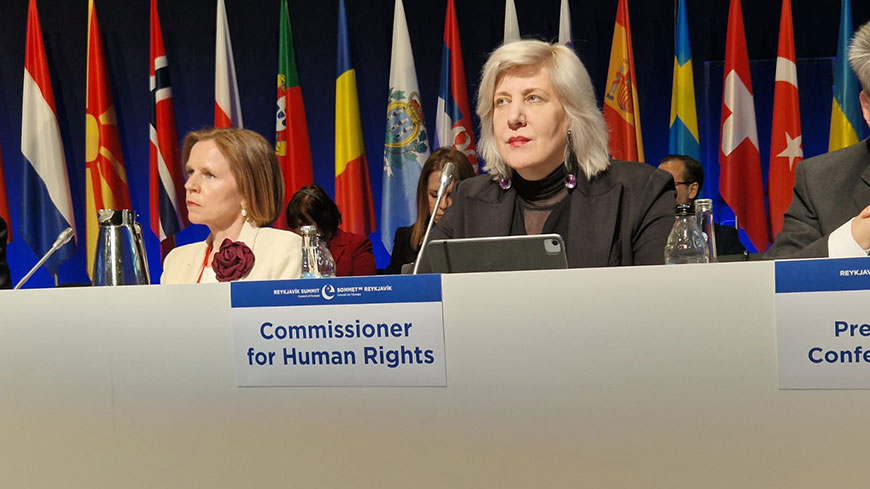Speech delivered by the Council of Europe Commissioner for Human Rights, Dunja Mijatović, at the 4th Council of Europe Summit in Reykjavik, Iceland
Presidents, Ministers, Chairperson, Excellencies,
Russia's war against Ukraine is the negation of all the values for which our Organisation stands. It is also the tragic epilogue to years of disregard for agreed human rights standards, and a cautionary tale of what can happen when a state disregards international law and the common rules established to guarantee international peace.
The pursuit of justice for victims and accountability for those responsible for the terrible human suffering and destruction caused by the war should remain a priority for our Organisation.
In March, I carried out my second visit to Ukraine since Russia’s full-scale invasion of the country. This visit focused mainly on the human rights of children who have been separated from their families or legal guardians and transferred to Russia or temporarily occupied territories of Ukraine
In the observations I issued after my visit, I called for unimpeded access to be given to records and information about all affected Ukrainian children. I also called for more urgent action and international co-operation on the family reunification of the affected children.
Concrete solutions should be identified to support the reunification of these children, including:
- by establishing and supporting a mechanism for reuniting Ukrainian children with their families and legal guardians,
- by providing more clarity regarding the entities and procedures through which parents, relatives, legal guardians, and children can seek assistance in family reunification.
We should spare no effort in moving forward on this painful and crucially important issue.
The emphasis on supporting Ukraine is both right and necessary, it is also crucial that it does not translate, including inadvertently, into a loss of focus on ensuring respect for human rights in all our member states. Focus must be maintained on addressing human rights backsliding and the erosion of the principles of democracy and the rule of law.
The centrality of the Convention system to this endeavour cannot be overstated. The execution of judgments of the European Court of Human Rights needs to be more systematic and expeditious. As part of the Convention system, my Office (the Office of the Commissioner for Human Rights) has been constantly engaged on these issues. It will continue to promote measures that can remedy deficiencies and prevent violations.
There are many areas where this should be done: countering attempts at weakening judicial independence and impartiality; ensuring the safety of journalists; facilitating the peaceful expression of opinion, including during public protests; addressing the human rights dimension of environmental degradation and climate change; countering the anti-gender backlash; promoting gender equality and protecting the rights of LGBTI people, persons with disabilities and minority groups; strengthening social and economic rights; gender equality. And crucially, ensuring a human rights compliant response to migration movements – in this connection, the generous response rightly given to Ukrainian people fleeing the war should hopefully make this task feel more just than daunting.
Some authorities have proposed or adopted laws that violate established human rights standards and the basic principles of human dignity.
This is a very dangerous path. Removing cornerstones from the edifice of international human rights law runs the risk of others falling, until the whole edifice collapses. Politicians have to be more far-sighted and courageous. Search and rescue efforts also need to be strengthened. Loss of life at sea is a tragedy that can and should be prevented.
In doing and delivering on all these issues, member states should support and protect civil society, human rights defenders and national human rights institutions. They are crucial partners in ensuring the long-term effectiveness of our human rights protection system. In this context, journalists and human rights defenders from Belarus and the Russian Federation should not be left out.
Our continent is in dire need of more, not less, human rights. The Council of Europe must remain the guardian of human rights, democracy, and the rule of law. States should better harness the power of youth, whose right to participate leads not only to better and more effective decisions but also enriches democracy and helps develop citizenship competencies for life.
The role of the Council of Europe is as crucial to the future of Europe as it was when it was founded more than 70 years ago. Member states must remain committed to its founding principles and values. Putting them into practice is not only a legal obligation. It is also the only way to pursue the goals of the Council of Europe.



